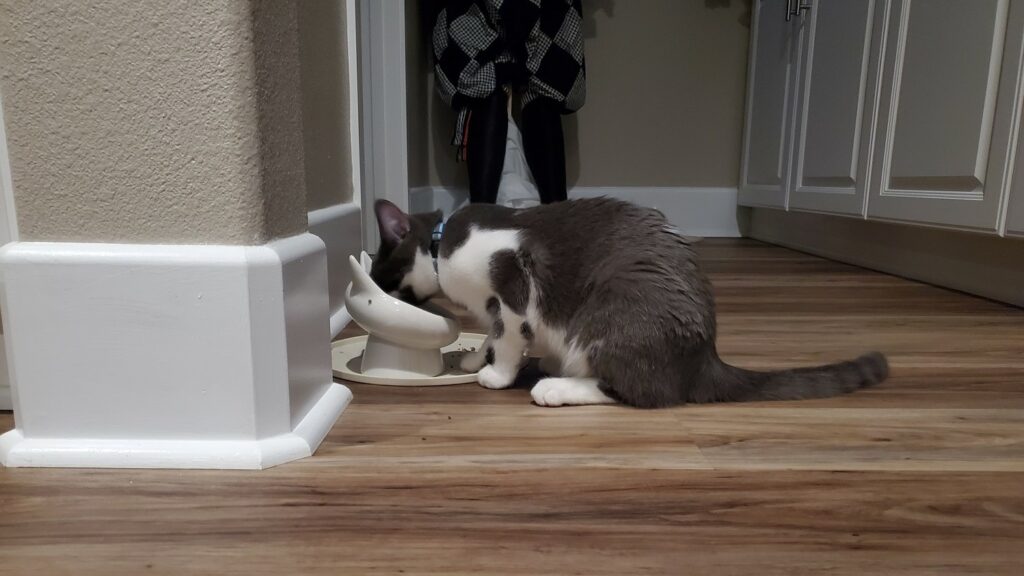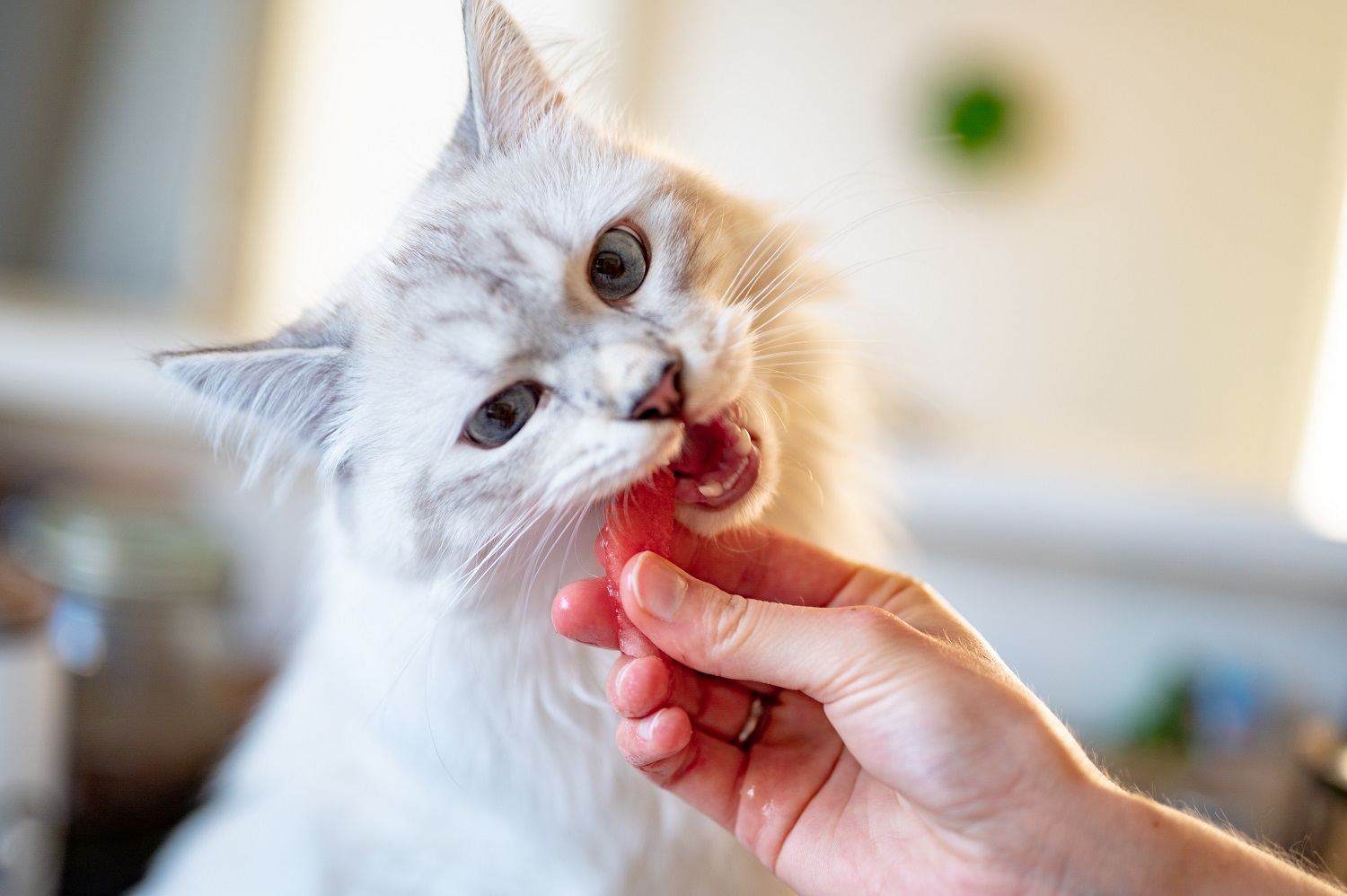Your kitten has a full belly, a stocked food bowl, and probably a treat or two in their near future. So why are they howling like they have not eaten in weeks the moment you walk into the kitchen?
Kittens that act like they are starving are not trying to manipulate you. They are just running on a different set of rules. Between their rapid growth, active metabolism, and natural instinct to secure resources, it is no wonder they seem ready to launch a hunger strike the moment the food bowl gets low.
Let’s take a closer look at why your kitten always seems hungry, how to tell if it is normal or not, and what you can do to manage the mealtime chaos.
Kittens Grow Fast and Burn Calories Even Faster
The biggest reason your kitten acts like a bottomless pit is simple. They are growing. Fast.
In their first year, kittens go through explosive development. Their bones, muscles, organs, and brains are all growing at high speed, and that kind of growth takes serious fuel. Pair that with bursts of energy, constant movement, and the occasional zoomie session, and you get a kitten that always seems one snack away from collapse.
Kitten metabolism is faster than adult cats, and they burn through calories quickly. They also need more frequent meals to keep their energy steady and their bodies developing properly.
It is not drama. It is biology.
How Often Should You Feed a Growing Kitten?
If your kitten acts like they are starving between meals, they may genuinely need more frequent feeding. How much and how often you feed depends on their age and size.
General feeding guidelines for kittens:
- Up to 6 weeks: Still nursing or on kitten formula every few hours
- 6 to 12 weeks: Four small meals per day
- 3 to 6 months: Three meals per day
- 6 to 12 months: Two to three meals per day, depending on appetite and energy levels
Always use food labeled for kittens. These formulas are higher in fat, protein, and nutrients to support rapid development. Adult cat food simply does not have the same nutritional density.
Hunger Cues vs. Habitual Begging
Just because your kitten acts hungry does not always mean they are. Kittens are excellent at learning routines, and if begging gets results, they will keep doing it.
Your kitten might beg because:
- They have learned that meowing = food
- They enjoy the attention or interaction
- They are bored and looking for stimulation
- You gave in once, and now it is part of the routine
If you feed your kitten every time they vocalize, they might associate mealtime with meowing, even when they are not truly hungry. This does not mean you should ignore them, but it does mean it helps to stick to a consistent feeding schedule.
Medical Reasons Your Kitten Might Always Seem Hungry
Most of the time, a hungry kitten is just… a hungry kitten. But in some cases, excessive hunger can be a symptom of an underlying health issue.
Possible medical causes of constant hunger include:
- Parasites: Intestinal worms can rob your kitten of nutrients, making them feel hungry even after eating.
- Malnutrition: If the food lacks essential nutrients, your kitten may eat more to try to compensate.
- Diabetes or thyroid issues: Rare in young kittens but possible in older cats or special cases.
- Gastrointestinal problems: Poor digestion can lead to reduced absorption of nutrients.
If your kitten is eating constantly but not gaining weight, or if their appetite seems unusually intense, it is worth scheduling a vet visit. A quick stool test or blood panel can rule out common problems.

Oh, human, you seem so puzzled. Yes, of course I’m still hungry! I’m a growing kitten… My little tummy needs to be filled constantly! I can’t help it if my growth spurt makes me hungrier than a lion on a diet! Just keep the food coming and nobody will get hurt. #AlwaysHungry #SnackTimeIsAllTheTime #FoodIsLife #FeedMeMorePlease #StarvingKitty
Joey
Tips for Managing the Mealtime Madness
If your kitten’s constant cries for food are starting to drive you up the wall, try a few of these strategies to keep both of you happy.
Stick to a schedule
Feeding at regular intervals helps your kitten feel secure and reduces the need for constant vocal begging. It also helps you monitor their intake more easily.
Use a puzzle feeder or slow bowl
Slowing down their eating helps them feel more satisfied and makes meals more mentally stimulating. This is especially helpful for kittens who inhale their food and then act like they are starving five minutes later.
Offer high-quality kitten food
Nutrient-dense food fills your kitten up faster and helps reduce persistent hunger cues. Look for a food that is rich in protein and fat, with no unnecessary fillers.
Limit treats and extras
Too many treats can throw off your kitten’s appetite and contribute to bad habits. Use treats sparingly, and not as a substitute for meals.
Rule out boredom
Sometimes kittens beg for food simply because they are bored. Add more playtime, toys, or interaction throughout the day. Mental and physical stimulation can reduce attention-seeking behaviors that look like hunger.
Final Thoughts: Your Kitten Is Not Faking It
When your kitten meows like they have not eaten in years, they are not trying to guilt-trip you. Most of the time, it is a combination of real biological need, routine, and a little bit of personality.
Kittens with big appetites are often healthy, active, and curious, which are all great signs. As long as you are feeding a proper kitten diet, sticking to a schedule, and checking in with your vet when something feels off, there is no need to stress over the drama at the food bowl.
Eventually, your growing kitten will become a full-grown cat with a slower metabolism and (slightly) more patience around dinner. Until then, enjoy the chaos, keep the meals coming, and know that this is all part of the wild ride of kittenhood.
Recent Posts
Your Cat Might Be a Furry Little Healer… or at Least a Fuzzy Alarm System If you’ve ever had your cat suddenly become extra clingy when you’re under the weather, you’re not alone. From...
Cats are experts at hiding things, socks under furniture, their disdain for your playlist, and, unfortunately, symptoms of illness. In the wild, showing weakness could make them a target, so even...


